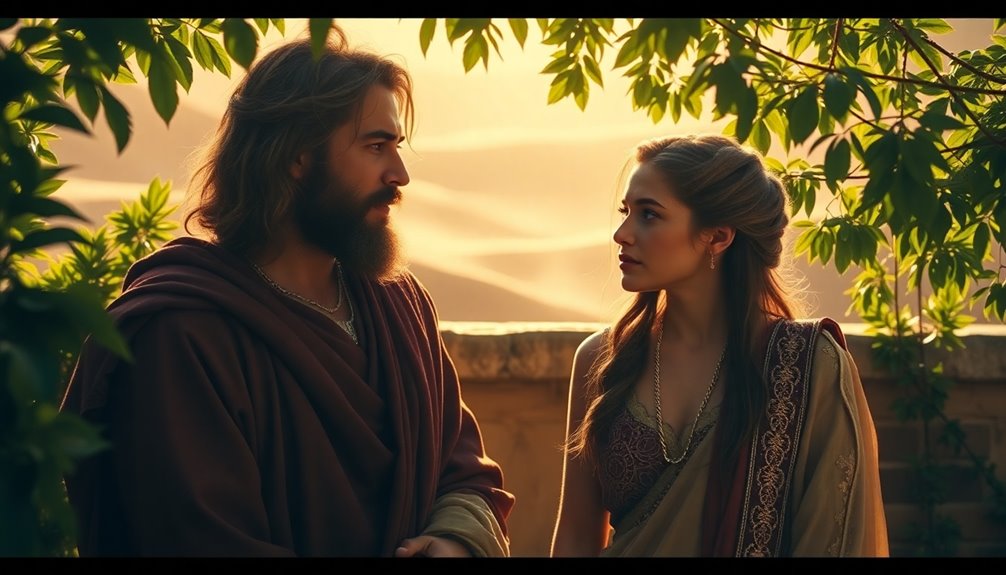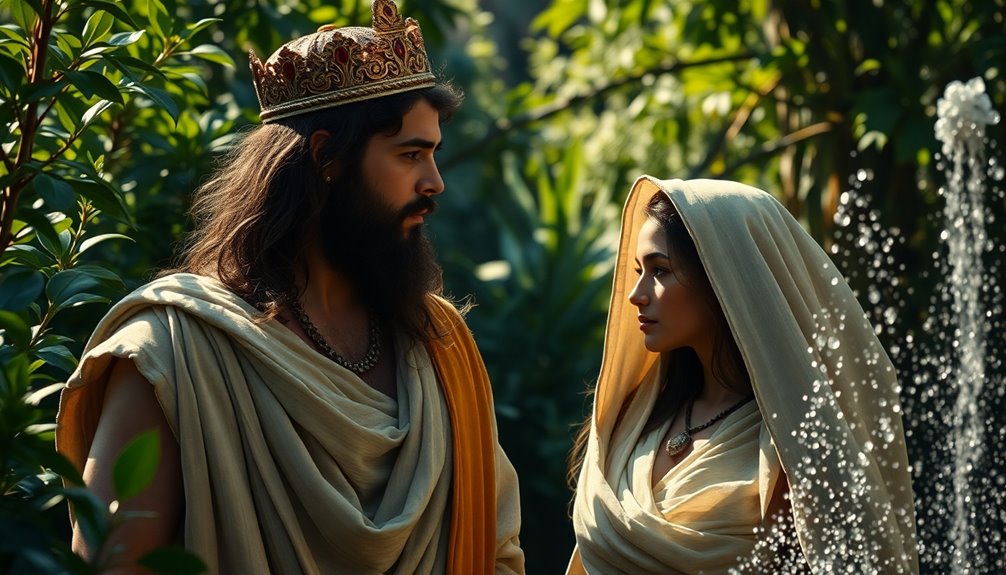David and Bathsheba's story captures the complexities of power, temptation, and moral responsibility. When David saw Bathsheba bathing, he succumbed to desire, leading to an affair that resulted in Bathsheba's pregnancy. To cover up his sin, David orchestrated the death of her husband, Uriah, showcasing a significant moral failing. Their narrative emphasizes the consequences of secret actions and highlights Bathsheba's ambiguous role, stirring debates about her agency. Bathsheba's lineage even has implications for religious history. If you explore further, you'll uncover deeper insights into their lives and the lessons we can learn from their choices.
Key Takeaways
- David's affair with Bathsheba began when he saw her bathing, leading to a series of tragic consequences, including Uriah's death.
- Bathsheba's story illustrates themes of power, vulnerability, and moral responsibility in relationships, highlighting the complexity of her role.
- Nathan the prophet confronted David, emphasizing accountability and the consequences of secret sins within David's household.
- Bathsheba's lineage plays a significant role in the Davidic line and is referenced in the genealogy of Jesus in Matthew 1:6.
- Artistic representations of Bathsheba explore her duality as a symbol of beauty and temptation, reflecting on the consequences of desire.
Introduction

The story of David and Bathsheba offers a powerful glimpse into human frailty and the consequences of our choices.
You see, David, the revered king of Israel, succumbed to temptation when he spotted Bathsheba bathing from his palace rooftop. His decision to pursue her led to a devastating affair that resulted in her pregnancy, irrevocably altering their lives and others around them. Bathsheba was the wife of Uriah, a loyal soldier who fought valiantly for David.
When Uriah refused to return home from battle, hoping to avoid the comforts that could compromise his duty, David's desperation grew. To cover his sin, David orchestrated Uriah's death, sending him back to the front lines to face certain doom. This act of betrayal marked a low point for David, showcasing the depths of his moral failing.
The aftermath was dire; the child born from David and Bathsheba's union died, and David faced tumultuous repercussions within his own family.
This tragic narrative serves as a stark reminder of how choices can lead to profound consequences, leaving you to reflect on the fragility of human integrity.
Biblical Textual Analysis

In analyzing the account of David and Bathsheba, you'll want to focus on the primary references in 2 Samuel chapters 11 and 12.
These chapters provide a detailed narrative of the events and their consequences.
Additionally, exploring secondary references, like Psalm 51, can reveal deeper insights into David's repentance and the broader themes of sin and forgiveness.
Primary Bible References
Often, readers turn to 2 Samuel 11-12 to explore the complex dynamics of David and Bathsheba's story. This account begins with Bathsheba bathing, which leads to David's illicit affair. As the wife of Uriah the Hittite, one of David's loyal soldiers, Bathsheba's identity adds layers to the narrative.
When Bathsheba becomes pregnant, David tries to conceal his sin by summoning Uriah back from battle. However, Uriah's unwavering loyalty prevents David from covering up the pregnancy, and the situation escalates tragically.
The prophet Nathan plays a crucial role in this story. He confronts David with a parable that reveals the gravity of his actions, prompting David's repentance. Nathan's engagement illustrates the theme of accountability and the inevitability of divine judgment.
God's judgment on David's household becomes evident after the tragic death of Bathsheba's first child. This consequence emphasizes that secret sins will ultimately be exposed, impacting not just the individual but those around them.
In analyzing these primary references, you see the profound lessons about sin, loyalty, and the far-reaching effects of one's actions. David and Bathsheba's story serves as a powerful reminder of moral responsibility.
Secondary Bible References
David and Bathsheba's narrative reverberates throughout the Bible, with various secondary references enriching its complexity. Their story, primarily documented in 2 Samuel 11-12, details the affair that led to Uriah's death and the profound consequences for David. This tragic event doesn't just end there; it echoes through scripture.
In Matthew 1:6, Bathsheba is mentioned as "the wife of Uriah," revealing her critical role in the genealogy of Jesus and underscoring the significance of her story in biblical history. Her influence extends further in 1 Kings 1:11-31, where she actively secures the throne for her son, Solomon, showcasing her political acumen and vital position in the royal lineage.
Additionally, Talmudic references hint that Bathsheba might be the granddaughter of Ahithophel, which adds depth to her character and familial ties.
The impact of her relationship with David is also evident in Psalm 51, traditionally attributed to David's repentance after his sin with Bathsheba, illustrating how their connection affected his spiritual life and legacy significantly.
Through these references, the complexities of Bathsheba's character and her relationship with David continue to unfold.
Ancient Near Eastern Customs

While exploring ancient Near Eastern customs, it's essential to understand that marriage functioned primarily as a contract between families rather than a romantic union. This perspective emphasizes alliances and social status over personal feelings, which plays a crucial role in Bathsheba's story. Initially, she's identified through her marriage to Uriah the Hittite, highlighting the limited agency women had in these societies.
In this context, the act of bathing in public wasn't scandalous; it reflected cultural norms where communal water sources were prevalent. However, the power dynamics at play are significant. King David, as a military leader, had the authority to summon Bathsheba, showcasing the inherent imbalance of power that allowed him to act on his desires with little regard for her autonomy.
After Uriah's death, Bathsheba's ability to remarry illustrates that, despite the oppressive customs, some social security existed for women. Yet, it's critical to recognize that these customs often placed women in vulnerable positions, underscoring the themes of power, control, and survival in Bathsheba's story: Surviving Abuse.
Cultural Significance of Bathsheba

Bathsheba's story resonates deeply within cultural narratives, serving as a powerful symbol of beauty, temptation, and the complexities of moral choices. Her tale has inspired countless artistic representations, especially in the works of Rembrandt and Rubens, which delve into themes of allure and the consequences of desire.
When David sees Bathsheba, the king of Israel's actions set off a chain of events that expose the darker sides of power dynamics and moral failure.
The narrative highlights Bathsheba's role in surviving abuse, as her experience reflects broader societal issues surrounding consent and exploitation. This cautionary tale about the repercussions of David's choices reverberates through literature and drama, prompting adaptations that explore guilt, redemption, and the intricate interplay between genders.
In theological discussions, Bathsheba emerges as a significant figure, with her lineage impacting the Davidic line, influencing interpretations across Judaism and Christianity.
As contemporary society grapples with themes of gender and power, Bathsheba's legacy invites you to re-evaluate historical narratives, ensuring her story remains relevant in today's discourse on morality and agency.
Bathsheba's Agency in the Narrative

When you examine Bathsheba's role in the narrative, you'll see that misconceptions often overshadow her true agency.
Understanding the historical context challenges you to rethink her actions and the power dynamics at play.
Debunking Common Misconceptions
Many readers view Bathsheba as a mere passive figure in her story, but this perspective overlooks her potential agency. When you consider her actions, such as bathing in view of David, it suggests she was aware of her surroundings and exercised some control over the situation (2 Samuel 11:2).
The biblical text doesn't explicitly depict Bathsheba as a victim, which invites you to question the assumptions surrounding her role. Some interpretations imply she may have had a part in the unfolding events, challenging the notion of her complete innocence (2 Samuel 11:3).
Scholars often debate whether Bathsheba's compliance was coerced by David's power, raising important discussions about consent and agency in their relationship within ancient societal norms.
Importantly, Bathsheba later asserts her influence in the royal court, particularly during Solomon's succession, which highlights her significant agency and role in shaping political dynamics (1 Kings 1:11-31).
This narrative prompts you to reflect on gender dynamics and how Bathsheba's portrayal mirrors societal attitudes towards women's roles and agency in both ancient Israel and contemporary interpretations.
Historical Context Challenges Interpretation
Agency in the context of Bathsheba's narrative is often overshadowed by the historical and cultural lens through which her story is interpreted. As you delve into the biblical account in 2 Samuel 11-12, it's clear that Bathsheba's agency is entangled in the power dynamics of a patriarchal society. Scholars debate her role, with some viewing her as a passive victim of David's lust, while others argue she showed agency by later approaching the king.
The cultural context complicates your understanding, as women were primarily seen as objects of desire during this era. Bathsheba's beauty is frequently highlighted in artistic representations, framing her actions within the parameters of male desire and power, which further obscures her agency.
The scriptural text offers limited insight into Bathsheba's voice, leading to varied interpretations. Feminist readings argue for a reevaluation of Bathsheba, suggesting she's more than just a catalyst for David's sin.
Moral Lessons From Bathsheba's Story

Bathsheba's story teaches you about the importance of personal responsibility in your relationships.
It also prompts you to reflect on how accountability plays a crucial role in your community.
Personal Responsibility in Relationships
Often, we underestimate the profound impact our choices have on ourselves and those around us, especially in relationships. Bathsheba's story serves as a stark reminder of how personal responsibility is crucial in navigating the complexities of human connections. Her decision to engage in an affair with King David, though tempting, led to devastating consequences that affected not only her life but also the lives of others, including Uriah and their child.
David's abuse of power in orchestrating Uriah's death to conceal the affair highlights the moral responsibilities we all bear. When we avoid accountability for our actions, we risk spiraling into a cycle of harm. The confrontation by the prophet Nathan marks a turning point, emphasizing the need for repentance and acknowledgment of how our choices impact others.
Ultimately, Bathsheba's marriage to David and the tragic loss of their child reinforce that forgiveness doesn't erase the repercussions of our decisions. This narrative reminds you that maintaining personal integrity and respect in relationships is essential.
Community Reflection on Accountability
The story of David and Bathsheba offers crucial insights into the necessity of accountability within communities. David's moral failures didn't just affect him; they spiraled into devastating consequences for Uriah, Bathsheba, and even his own family. This narrative emphasizes how crucial it's for individuals to have accountability partners, like Nathan, who can confront us when we stray from the right path. It's uncomfortable, but those hard truths often lead to necessary reflection and change.
When you consider David's eventual repentance in Psalm 51, it's clear that acknowledging your wrongs is vital. Accountability can open avenues for spiritual restoration, but it also highlights that forgiveness doesn't erase the repercussions of your actions. The turmoil that followed David's choices illustrates how deeply our decisions can reverberate through our lives and the lives of others.
Moreover, Bathsheba's story urges you to reflect on the dynamics of power and consent. It's not just about personal accountability; it's about ethical responsibilities in relationships. You're called to respect the autonomy of others, ensuring that your actions contribute positively to the community.
Final Thoughts on Bathsheba

The story of Bathsheba illustrates profound lessons about power and vulnerability, reminding us of the intricate dynamics between personal choices and their far-reaching consequences.
Bathsheba's relationship with King David serves as a cautionary tale about the abuse of power and the impact of infidelity. While David holds the throne, Bathsheba becomes a pawn in a game of politics and desire, showcasing how even the most powerful can exploit those with less authority.
Her narrative emphasizes themes of loss and mourning, particularly after the death of their first child, a tragic outcome directly linked to their sinful actions. This loss deepens our understanding of Bathsheba's complexity—she is both a victim of David's desires and a figure who ultimately finds agency within her circumstances.
The portrayal of Bathsheba throughout history reflects societal attitudes toward women and morality, often oscillating between victimhood and empowerment.
Moreover, Bathsheba's mention in the genealogy of Jesus highlights her significant role in biblical history, reminding you that even those entangled in moral complexities can play crucial parts in the divine narrative.
Bathsheba's story encourages reflection on how personal choices resonate through time.
Additional Resources

Exploring the story of David and Bathsheba offers a wealth of insights, and many additional resources can deepen your understanding of this complex narrative. Start by delving into 2 Samuel 11-12, where you'll find the full account of their affair and its grim consequences.
To grasp the broader implications of their story, consider reading scholarly texts that examine the themes of abuse and loss, particularly how David's misuse of power impacted Bathsheba's life.
You might also explore Talmudic references that discuss Bathsheba's lineage, adding depth to her character and the role she plays in biblical genealogy. The significance of Bathsheba as Uriah's wife in Matthew 1:6 illustrates her importance in the lineage of Jesus, making her story even more compelling.
Cultural depictions, especially the artworks of Rembrandt and Rubens, provide visual interpretations of Bathsheba's story, reflecting on beauty, temptation, and moral complexities.
These resources won't only enhance your understanding of David and Bathsheba but also encourage you to reflect on the lasting effects of their actions in the context of human experiences.
Frequently Asked Questions
What Is the Story of David and Bathsheba?
You might find the story compelling as it unfolds themes of desire, betrayal, and consequence.
A king, driven by lust, acts upon his impulses without considering the repercussions. His attempts to cover up a disastrous affair lead to manipulation and even murder.
Eventually, he faces divine judgment, which results in deep remorse and a quest for redemption.
Through this narrative, you see how human flaws can lead to significant consequences and ultimately, divine purpose.
What Is the Moral of the Story of David and Bathsheba?
The moral of the story emphasizes the dangers of unchecked desire and the abuse of power.
It shows how one poor choice can lead to a cascade of consequences, affecting not just yourself but those around you.
It underscores the importance of accountability and repentance; while forgiveness is attainable, the repercussions of your actions can linger.
Ultimately, it reminds you to consider the broader impact of your decisions on your relationships and community.
Where in the Bible Does It Say David Sleeps With Bathsheba?
You'll find the account of a notable affair in 2 Samuel 11:2-5.
In these verses, a king sees a beautiful woman bathing and decides to summon her to his palace. This encounter leads to significant consequences for both individuals involved.
The narrative unfolds further as the story reveals the complexities of their relationship and the moral implications of their actions.
It's a powerful lesson on desire, responsibility, and the ripple effects of choices.
What Were the Consequences of David Sleeping With Bathsheba?
When you consider the consequences of an adulterous act, you see a cascade of turmoil.
You might face emotional distress, loss, and public disgrace. Relationships can suffer irreparably, leading to betrayal and heartbreak.
The fallout can also impact innocent lives, resulting in guilt and regret.
Ultimately, your choices can bring severe repercussions, affecting not just you but also those around you, highlighting the profound weight of your actions.










